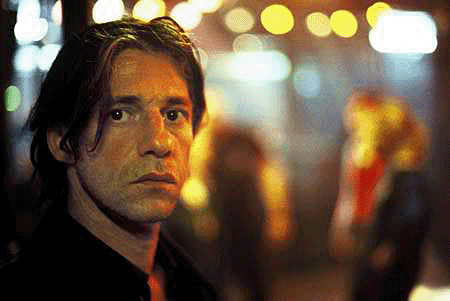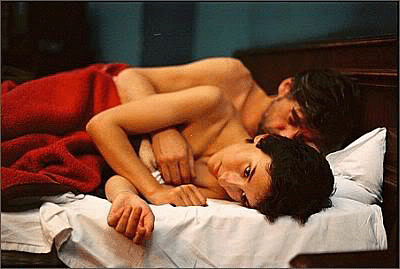(a.k.a. 'Head-on', 2004) presenting an unlikely love story of two
German Turks: an uprooted alcoholic and a young woman who wants to break free
from her family. Gegen die Wand is not a political film but applies
nuance in the heated debate about the multicultural society.
 |
|
Birol Ünel as Cahit Tomruk
|
Greek Tragedy
In the last scene of the film Gegen die Wand
the male protagonist Cahit Tomruk (Birol Ünel) gets in the bus to return to
his hometown after many years.
He is gonna sit in the opposite direction of
traffic. Not his face, but his back is turned to the future. Although director
and screenwriter Fatih Akin doesn't comment about his fate, this last
melancholy image is significant. Between the tumultuous beginning and the
wonderfully calm ending a drama has been unfolded that plays out like a Greek
tragedy. Cahit went to hell and back for the love of a young woman, half his
age, to lose her and find her back. To see an acute death wish change in an
unexpected love of life. The pathos of this brief description is significantly
exceeded by the film Gegen die Wand. Akin's tells his story in a
recklessness and bravado manner which seems to consist of only highs and lows.
And he remains totally credible.
Desperate
The film Gegen die Wand reveals a story
on universal themes that are connected to actual and contextual issues: love,
desire, sacrifice, and the loss of life of a second generation of Turks who
must construct an identity between often conflicting cultures. Akin is an
experienced practioner, as a child of Turkish parents growing up in Hamburg
(Germany). A desperate friend asked him once to join her on a marriage of
convenience, so that she could escape the rigidity of a traditional Muslim
family. This experience was the starting point for the film.
Obscure
The story about Cahit and Sibel (Sibel Kekilli)
is in the first place a fascinating tale of two marginal persons who crosses
each other's path, with extreme consequences on both their lives. In the first
minutes of the film Gegen die Wand it becomes clear that the conflict
between tradition and freedom is the leading thread running through their
history. On the (river)banks of the Bosporus a traditional orchestra performs
a dramatic song about an unhappy love. With a hard schnitt the ground is
shifted to the grubby concert hall, where the lights just go on again and the
cleaners start clearing the mesh. It is dificult to imagine two worlds that
are further apart. The restrained tradition of the orchestra in Istanbul and
the obscure, hedonistic atmosphere of Cahit Tomruk's workplace.
 |
| Sibel Kekilli (front) and Birol Ünel
|
Suicide
Except for his name there's little that
bespeaks Cahit's Turkish origin. He is a destructive alcoholic who, on just
one night, decides to drive his car full throttle against a blank wall. He
survives the crash and is admitted to a psychiatric clinic where a doctor
tells him that there are other ways than suicide to end his life. Starting a
new life for example. This opportunity is offered to Cahit when he meets Sibel,
a beautiful girl half his age. Also Sibel has been admitted to the clinic
after a suicide attempt, but unlike Cahit she wants to live life to the
fullest. Therefore she first have get loose of her strict father and brutal
brother, who already broke her nose once when he caught her with a boyfriend.
Sibel asks Cahit to marry her. And that is the start of a love story that
turns into a tragedy.
Dingy
Akin succeeds in making his film Gegen die
Wand believable because he uses any means to carry away the viewer into an
emotional rollercoaster.
A driving, eclectic soundtrack; an editing style in
which every superfluous and retarding shot has been cut; an energetic and
physical camerawork which is dingy enough at the decisive moments to resist
the threat of too much sentiment. But Akin's main tools are his two carefully
constructed characters.
The film is driven by the character development. The
change of the two main characters determine the plot development.
Transformation
Gegen die Wand
is a powerful and compelling portrayal of two strong individuals. The
charismatic Birol Ünel undergoes a complete transformation, from a drunk and
seedy borderliner into a man with a mission. With his pock-marked, broken down
appearance he forms a great contrast with the beautiful, fragile Sibel Kekilli.
In 2004 the film Gegen die Wand won the Golden Bear at the
Berlin Film Festival because of the very clear way Akin pinpoints the
ambiguity of a generation that has been trapped between two cultures.
More articles on film can be found in our >
Movie
Art category
More info on the >
film
Gegen die Wand